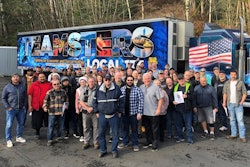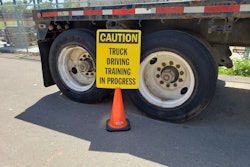The Department of Labor on Wednesday, Jan. 10, will finalize a rule that rolls back a Trump-era rule offering guidance on determining employee or independent contractor classification under the Fair Labor Standards Act. Early reactions from trucking associations and labor groups generally split when it comes to favor or furor over the change.
The rollback has been in the works since the Biden Administration took office in 2021. The Trump Administration’s DOL, as one of its final acts in January 2021, published a rule that included a test to determine if a worker was independent or an employee that relied on five factors, but put greater emphasis on two “core factors” -- the nature and degree of the worker’s control over the work and the worker’s opportunity for profit or loss.
Other “non-core factors” included the amount of skill required for the work; the degree of permanence of the working relationship between the worker and the potential employer; and whether the work is part of an integrated unit of production.
The effective date of the rule was March 8, 2021, but on March 4 of that year, the Biden DOL delayed the effective date, then on May 6 withdrew the rule completely. A lawsuit challenging the department’s delay and withdrawal, however, led the U.S. District Court for the Eastern District of Texas to issue a decision vacating the delay and withdrawal, allowing the Trump-era rule to take effect.
Backtracking, the DOL in October of 2022 issued a notice of proposed rulemaking to rescind and replace the 2021 rule. The department said it “believed that the 2021 IC Rule did not fully comport with the FLSA’s text and purpose as interpreted by courts and departed from decades of case law applying the economic reality test.”
The final rule publishing Wednesday will take effect 60 days after its publication in the Federal Register, on March 11.
[Related: Biden DOL a step closer to rolling back Trump-era worker classification rule]
Instead of using the “core factors” that were part of the 2021 IC rule, the new rule returns to a “totality-of-the-circumstances analysis” that considers the worker’s “economic reality” through six factors weighted equally, DOL said. “The department believes this rule is more grounded in the ultimate inquiry of whether a worker is in business for themself or is economically dependent on the employer for work. Workers, employers and independent businesses should benefit from affirmative regulatory guidance from the department further developing the concept of economic dependence.”
The department said in its final rule that, as a general matter, most employees, labor unions and worker advocacy groups expressed support for the proposal to rescind the Trump-era rule. By contrast, commenters who identified as independent contractors and business entities were generally opposed to the proposal, “criticizing the department’s proposed economic reality test as ambiguous and biased against independent contracting.”
The Owner-Operator Independent Drivers Association's own comments filed to the 2022 proposal noted it was "difficult to determine the full implications” of the proposal and what it would mean for truck drivers and owner-operators. At the same time, the association said, “we support the department’s stated approach that seeks to examine all aspects of a working relationship and makes clear that no one factor is dispositive. We also support the department’s stated intent to follow decades-long practices for classification under the FLSA,” which has allowed owner-operators to work as independent contractors.
In new comments issued Tuesday, OOIDA President Todd Spencer said "truckers are tired of the endless parade of classification rules that do not listen to their concerns."
The "constantly changing landscape," he added, "has created uncertainty that makes it more difficult for them to operate their businesses. We are still reviewing all the details in the final rule, and it is too soon to know what the exact effect of this final rule would be."
Spencer did, however, continue to lean toward the group's original position that it has "concerns that some details contained in the rule may disregard specifics of the trucking industry and could lead to the reclassification of independent contractors as employees. With that said, we support the department’s stated intent to follow decades-long practices for classification under the Fair Labor Standards Act, as well as its rejection of the ABC Test as signed into law in California with AB5."
Spencer concluded that any rule related to classification "must allow for owner-operator relationships to be examined on a case-by-case basis. This approach has historically allowed owner-operators to work as independent contractors and generally protected workers from misclassification. As we continue to review the final rule and engage with the department and Congress about this rulemaking, we will fight to protect the rights of small-business truckers, owner-operators and all of America’s hard-working truckers.”
The American Trucking Associations sharply criticized the DOL over the final rule.
“I can think of nothing more un-American than for the government to extinguish the freedom of individuals to choose work arrangements that suit their needs and fulfill their ambitions,” said ATA President and CEO Chris Spear. “More than 350,000 truckers choose to work as independent contractors because of the economic opportunity it creates and the flexibility it provides, enabling them to run their own business and choose their own hours and routes.”
Spear noted trucking “has used independent contractors since the inception of interstate trucking. … It's unfortunate that the Administration has chosen to replace a clear and straightforward standard with a tangled mess that weakens our supply chain and undermines the livelihoods of hundreds of thousands of truckers across the country.”
Dave Heller, vice president of safety and government affairs with the Truckload Carriers Association, said the "truckload industry has and will continue to support the IC model which has proven itself to be critical to the standard mode of freight delivery this nation uses to support its economy." He added that "jeopardizing the freedoms of those businesspeople that have chosen to become entrepreneurs stand[s] against the American dream that this country was founded upon and endangers a business model that continues to thrive for a nation that needs them."
Heller concluded that "TCA will continue to work with all stakeholders to defeat this anti-industry rule."
DOL has maintained throughout the rulemaking process that it does not believe the new rule will “result in widespread reclassification of workers,” noting that for workers who are properly classified as independent contractors, the department “does not, for the most part, anticipate that the guidance provided in this rule will result in these workers being reclassified as employees.”
[Related: AB 5's latest: Why interstate trucking should be exempt]
The six economic reality factors the rule will enshrine in regulation for independent contractor/employee determinations are as follows:
Opportunity for profit or loss depending on managerial skill. Does the worker hold true opportunity for profit or loss based on managerial skill (including initiative or business acumen or judgment)? Does that opportunity affect the worker's economic success or failure in performing the work? If a worker has no opportunity for a profit or loss, then this factor suggests the worker is an employee.
Investments by the worker and the potential employer. This factor considers whether any investments by a worker are capital or entrepreneurial in nature. Costs to a worker of tools and equipment to perform a specific job, costs of workers’ labor, and costs that the potential employer imposes unilaterally on the worker, for example, are not evidence of capital or entrepreneurial investment and indicate employee status.
Investments that are capital or entrepreneurial in nature, rather, and thus indicate independent contractor status generally support an independent business and serve a business-like function, such as increasing the worker's ability to do different types of or more work, reducing costs, or extending market reach.
DOL said the focus of this factor should be comparing the investments of a worker and employer to determine whether the worker is making similar types of investments as the potential employer, even if on a smaller scale, to suggest that the worker is operating independently.
Degree of permanence of the work relationship. This factor weighs in favor of the worker being an employee when the work relationship is indefinite in duration, continuous, or exclusive of work for other employers. It weighs in favor of the worker being an independent contractor when the work relationship is definite in duration, non-exclusive, project-based, or sporadic based on the worker being in business for him- or herself and marketing their services or labor to multiple entities.
Nature and degree of control. To what extent does the potential employer control the performance of the work and the economic aspects of the working relationship? Facts relevant to control include whether the potential employer sets the worker's schedule, supervises the performance of the work, or explicitly limits the worker's ability to work for others.
Extent to which the work performed is an integral part of the potential employer's business. Is the work performed an integral part of the potential employer's business? This factor weighs in favor of the worker being an employee when the work performed is critical, necessary or central to the potential employer's principal business, and it weighs in favor of the worker being an independent contractor when the work they perform is not critical, necessary or central to the potential employer's principal business.
Skill and initiative. Finally, this factor considers whether the worker uses specialized skills to perform the work and whether those skills contribute to business-like initiative.
[Related: Trucking groups, owner-ops generally opposed to Biden DOL's contractor rule changes]











